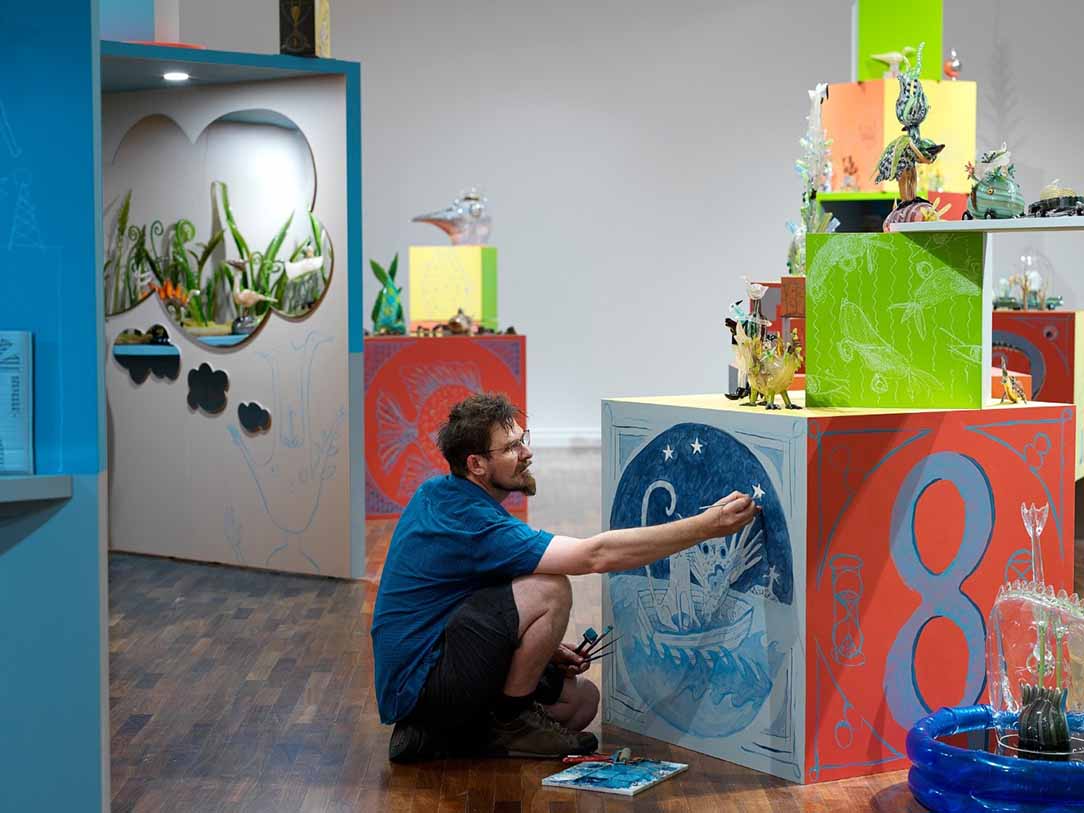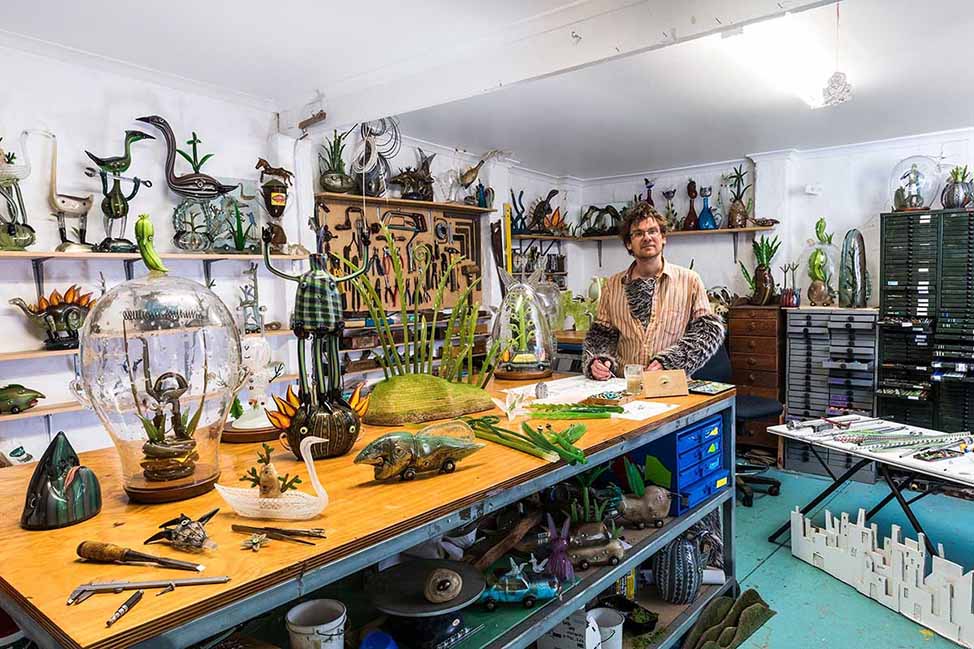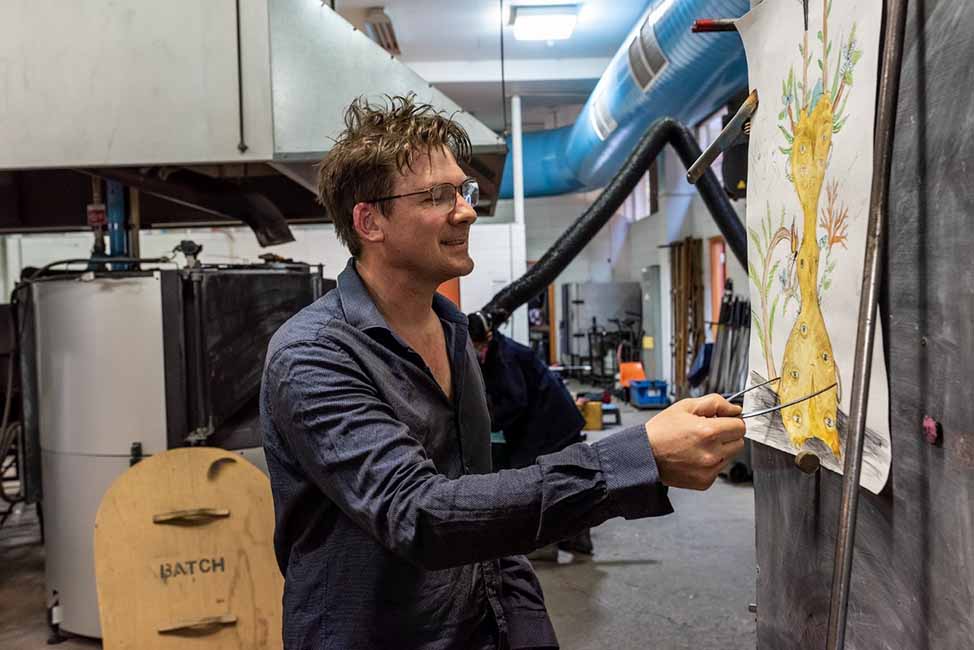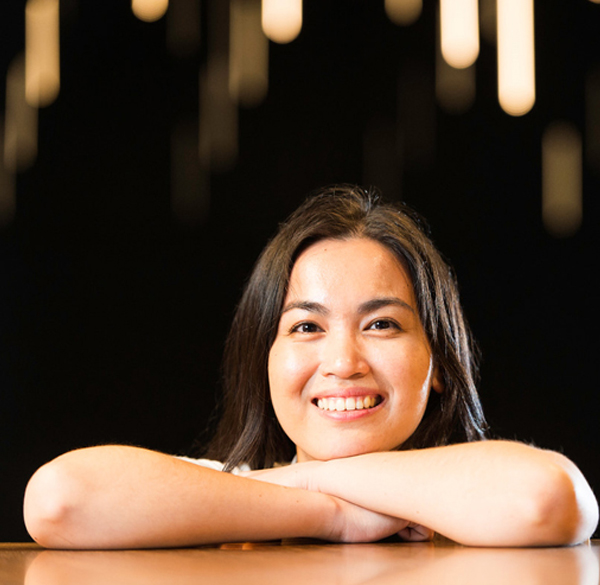
Dr Tom Moore’s glass sculptures are equal parts weird, playful, and sophisticated – but they tap into a deeper well to ask questions about the overexploitation of our natural resources. A recent major solo exhibition at Adelaide’s JamFactory shone a spotlight on Moore’s artistic practice ahead of a large-scale tour set to show at 12 regional Australian art galleries over the next two years.
Moore attained a PhD in visual art from the University of South Australia in 2019 with assistance from the Sydney Ball Friends of the South Australian School of Art Scholarship, where he is currently engaged as an Adjunct Research Fellow.
His enchanting glass artworks take diverse animal and plant forms as models for beautiful, captivating and sometimes unsettling anthropomorphic sculptures. This body of work – an expansion of recently completed doctoral research – playfully prompts the viewer to consider the relationship between human activity and environmental degradation.
The artist’s journey towards doctoral research began late in his glassmaking career. After graduating from the Canberra School of Art (now the School of Art & Design at Australian National University), he moved to Adelaide to undertake the JamFactory’s highly regarded Associate program. There, he developed his skills and technical production capacity before accepting the role of production manager for the glass workshop where he remained for fifteen years.
Countless commissions, prototypes, and small to large-scale productions later, Moore felt the time was right to delve deeper into his experimental art practice, which he had been exploring and developing alongside his day-to-day production duties.
“I began to yearn for the opportunity to focus entirely on my own art-making practices,” he says.
“I was keen to see how concerted investigations of the themes that were driving my artwork would influence subsequent works.”

These investigations began to take shape in 2015, when Moore commenced his PhD candidature specialising in hot glass sculpture. Through the process of making, he identified latent and emerging themes in his sculptural practice that are identifiable in his work today – themes that revolve around extraction, heat, refinement, and fusion of natural resources.
Recurrent motifs in the work created over the next four years included native Australian animals like kookaburras and kangaroos, set near, alongside, or on top of a contradictory assembly of cars, flames, flowers and grass.
The resultant sculptures are skilfully joined, embracing states of hybridity that both invoke and reject the traditional elegance of ornamental glass objects.
Moore’s works engage closely with a familiar narrative around climate change and an overexploitation of natural resources. His works embrace, rather than shy away from, the contradictions in this expression.
“The refinement … of natural resources into glass is a credit to the wonderful possibility of human ingenuity,” he says.
“However, there is an increasing risk that the overexploitation of resources is leading to environmental peril.”
The fused human-animal-plant forms that Moore favours are, he points out, intended as “somehow paradoxical”. They grapple with the tension between, on the one hand, the impact of a resource-heavy glassblowing process, and, on the other hand, the social and environmental messaging in his work.
Over four years of candidature, Moore’s practice-based research grew and changed with his discoveries. He describes his research journey as transformative in both purpose and impact, allowing him to develop sound theoretical and practical underpinnings for a sophisticated artistic practice.

“I am now better equipped to examine and to articulate the philosophical underpinning of my intentions,” he says.
“I used to aspire to mastery of the material and now I am more inclined to think of the act of making as more akin to a collaboration, whereby the glass itself is able to suggest what will happen.”
Moore’s solo exhibition Abundant Wonder is the resolution of this doctoral project but does not signify its conceptual end. The exhibition has embarked on a major regional tour, from JamFactory’s Seppeltsfield showroom through to the Bay Discovery Centre in Glenelg – via Wagga Wagga, Bundaberg, Tamworth, Geelong and more. The regional tour opens doors for Moore’s work, and his profile as a forerunner in the Australian glass scene.
The tour is also accompanied by an innovative education program, where children can enter a drawing competition inspired by the works within Abundant Wonder. The winning design from each venue will be realised in glass form and join the exhibition on tour.
For Moore, this opportunity to share the resolution of years of research, skill development and artistic practice is a rewarding milestone in the journey. It represents a certain optimism in an industry that has been hit hard by COVID-19 related cancellations and closures.
“Many people report how exciting and hopeful it is to see these things,” he says.
“It is extremely gratifying to see such a long-term plan come together in ways that have exceeded my wildest dreams.”
Visit Abundant Wonder in person at various regional locations across Australia
100% of your gift will go directly to support the UniSA Scholarship Fund - there are no administration fees, no overheads and no hidden costs
You can give someone else a boost towards their future. Support our future students and help us provide as many scholarships, grants and prizes as possible.
